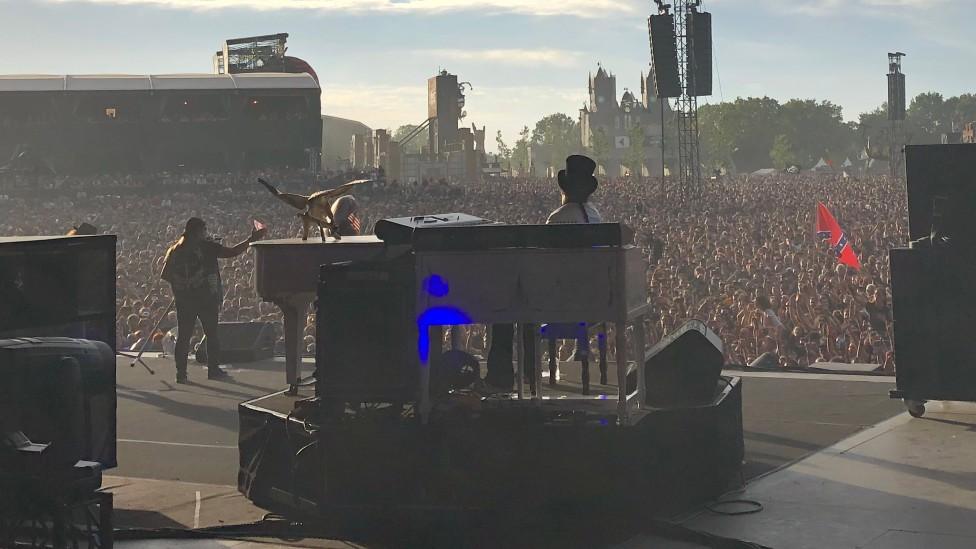Musicians 'failed by government' over EU touring, stars say
- Published
- comments

Liam Gallagher, Sir Elton John and Nicola Benedetti have put their names to the letter
Some of the UK's biggest music stars have written to the government demanding action to ensure visa-free touring in the European Union.
Sir Elton John, Liam Gallagher and Nicola Benedetti are among 110 artists who have signed the open letter.
It said they had been "shamefully failed" by the government over post-Brexit travel rules for UK musicians.
The government said the signatories should be asking the EU why they "rejected the sensible UK proposal".
Culture Secretary Oliver Dowden will meet music industry representatives on Wednesday to address their concerns.
'The door is open'
Earlier this week, culture minister Caroline Dinenage said the EU's "very broad" offer "would not have been compatible with the government's manifesto commitment to take back control of our borders".
However, she said "the door is open" if the EU was willing to consider the UK's proposals to reach an agreement for musicians.
In the meantime, she confirmed, musicians and artists touring the continent "will be required to check domestic immigration and visitor rules for each member state in which they intend to tour".
That may require them to have multiple visas or work permits, which some industry experts say will be expensive and potentially prohibitive - especially for musicians at the start of their careers.
Other names on the open letter include Ed Sheeran, Sir Simon Rattle, Sting, Radiohead, Sheku Kanneh-Mason, Kim Wilde, Roger Daltrey, Glastonbury organisers Michael and Emily Eavis, and Judith Weir, Master of the Queen's Music.
The letter was organised by the Incorporated Society of Musicians and the Liberal Democrats, and published in The Times, external.
"The reality is that British musicians, dancers, actors and their support staff have been shamefully failed by their government," it said.
"The deal done with the EU has a gaping hole where the promised free movement for musicians should be. Everyone on a European music tour will now need costly work permits for many countries they visit and a mountain of paperwork for their equipment."
The extra costs will "tip many performers over the edge", it claimed.
"We call on the government to urgently do what it said it would do and negotiate paperwork-free travel in Europe for British artists and their equipment," it added.
"For the sake of British fans wanting to see European performers in the UK and British venues wishing to host them, the deal should be reciprocal."
The Who frontman Daltrey signed despite telling the BBC Radio 4's Front Row programme in 2018: "It's nothing that can't be solved. I mean, we used to work in Europe before the EU was even thought about. We had the golden period of the 60s and the 70s."
The Who frontman Roger Daltrey gave his take on Brexit in 2018
On Wednesday, the veteran rocker said the two positions were compatible. "I have not changed my opinion on the EU," he said in a statement to the PA news agency. "I'm glad to be free of Brussels, not Europe.
"I would have preferred reform, which was asked for by us before the referendum and was turned down by the then president of the EU. I do think our government should have made the easing of restrictions for musicians and actors a higher priority.
"Every tour, individual actors and musicians should be treated as any other 'goods' at the point of entry to the EU with one set of paperwork. Switzerland has borders with five EU countries, and trade is electronically frictionless. Why not us?"
'A clear message'
Deborah Annetts, chief executive of the Incorporated Society of Musicians, said: "World-renowned performers, emerging artists from every genre and the most respected figures from leading organisations within our sector are now sending a clear message.
"It is essential for the government to negotiate a new reciprocal agreement that allows performers to tour in Europe for up to 90 days, without the need for a work permit."
Responding to the letter, a UK government spokesperson said that musicians' concerns were being taken seriously.
"We absolutely agree that musicians should be able to work across Europe," they said in a statement.
"The UK Government put forward a proposal, based on feedback from the music sector, that would have allowed musicians to tour - but the EU repeatedly rejected this.
"The EU's offer in the negotiations would not have worked for touring musicians: it did not deal with work permits at all, and would not have allowed support staff to tour with artists. The signatories of this letter should be asking the EU why they rejected the sensible UK proposal."
Culture Secretary Oliver Dowden is due to host a roundtable discussion with representatives from the music industry, addressing their concerns, on Wednesday.

Follow us on Facebook, external, or on Twitter @BBCNewsEnts, external. If you have a story suggestion email entertainment.news@bbc.co.uk, external.
Related topics
- Published14 January 2021

- Published12 January 2021
